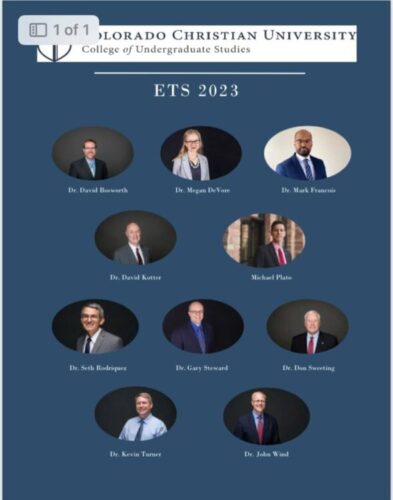
This week I had the privilege of presenting another paper as well as participating in a panel at the annual gathering of the Evangelical Theological Society (ETS), held this year in San Antonio, Texas. We were located a block from the Alamo (which is worth the visit and reminded me again that Texas once was another country!).
ETS was formed in 1949 “to foster conservative Biblical scholarship” by providing a forum for “the oral exchange and written expression of thought and research” in the theological disciplines “as centered on the Scriptures.” (ETS Constitution, Article II). ETS and the Society for Biblical Literature (SBL)—a much broader and more secular counterpart—typically meet around the same time, in the same city. I have presented papers at both, but I find that SBL has a sterile, fragmented feel to it, whereas there is a sense of Christian fellowship at ETS that inevitably lifts your spirit. This is not to say that there is not diversity and disagreement at ETS, there is plenty. But this happens within the bonds of Christian orthodoxy and that makes it feel richer.
The broad theme of this year’s gathering was ‘Theological Anthropology,’ focusing on what it means to be made in the image of God. Over 2,000 attended and, by my count, there were over 700 presentations (although I’m told that twice that number of proposals were submitted!).
I participated in the panel on Christian higher education. A few years ago, I proposed this as a general session to ETS. Why? Because they have sessions focused on every discipline of theological education under the sun, but nothing on Christian higher ed. That struck me as odd, because every scholar and every school represented at ETS depends upon the health, viability, and vitality of their institutions. Not to mention, a number of provosts, presidents, chancellors usually attend ETS, but there was no session for them to address important issues. So happily ETS agreed to include such a session. For two years running now this session has proved itself by all the people who attend. There is great interest in this. I am grateful for David Dockery who moderated it, and for those who served on this year’s panel—Ligon Duncan from Reformed Theological Seminary, Scott Rae from Talbot School of Theology, Chris Morgan from California Baptist University and myself. We talked a lot about the deepening crisis of confidence in higher education in general and how all of us must be making an apologetic argument for not just seminary education, but university education in general, and Christian university education in particular. Other topics that came up included: what do we mean by the integration of faith and knowledge, what are the headwinds that we are all facing (mainly in the area of attacks on religious liberty), and we focused on the amazing opportunities that convictionally Christian colleges, universities, and seminaries all have at this time.
I also delivered a paper for the ‘Practical Theology’ session on “The New Longevity in the Ministry of Evangelical Leaders,” looking at our expanding lifespans and the seismic demographic shift from the 40-year career to the 60-year career and what this means for theological education.
Part of the fun (yes fun!) of going to ETS is that there are academic papers delivered on every theological topic imaginable. Some tend to be highly focused on academic minutiae i.e. “The Hill Country of the Amorites: Middle Bronze Cooking Pots and Cultural Identity.” I did not go to that one!
Each year I am able to attend about eight sessions. My favorites this year were Timothy George’s address, “ETS at 75: A Community of Love and Conviction,” one on Calvin and Augustine’s Political thought, another on “How Can We Love and Honor Church Leaders with Complicated Pasts,” another on “Love, Consciousness and the Trinity,” another on “The Hamas-Israeli War as a Redefining Moment” given by Darryl Bock, a session with Christopher Watkins on his book Biblical Critical Theory, and a session by Steve Bracey about “What Conservativism Teaches About Theological Anthropology.” Sound academic? It is!
There were several other highlights for me. One is the late-night receptions held by some of the seminaries for their alumni who attend ETS. I went to the Trinity Evangelical Divinity School reception. I also usually drop in at Southern Seminary’s reception, which is always outstanding, packed, and highlighted by an address from their president, Al Mohler.
ETS also provides an opportunity to visit with other friends who attend. Both of my pastorates were near seminaries, so I ended up being pastor to a number of these people both in Illinois (with Trinity nearby) and in Colorado (with Denver Seminary nearby). It’s also good to visit with former colleagues from Reformed Theological Seminary. And a big congratulations to my successor at RTS Orlando, Scott Swain, who was announced as a future president of ETS (they have one-year terms).
Another highlight is our CCU faculty team. By my count I think we sent more scholars than most seminaries or universities (apart from Southern and RTS, which, I believe, send the most). We also sent thirty CCU students who served as ushers for this year’s ETS. It was a joy to hang out with these students and to see them recognized for their great contribution this week.
A final highlight of ETS is the bookstore. That alone makes ETS worth attending. All the major theological publishers have tables and tables of books. It’s like being in a candy store. My suitcase is usually bulging after ETS. It’s yet another one of the blessings of ETS.
Underneath all of these things at ETS is the blessing of serious academic study and the knowledge that is obtained from it. ETS represents theological learning at the highest level. But it is not learning for learning’s sake. It is learning for the good and blessing of the church and people everywhere. That is what a conference like this promotes.
